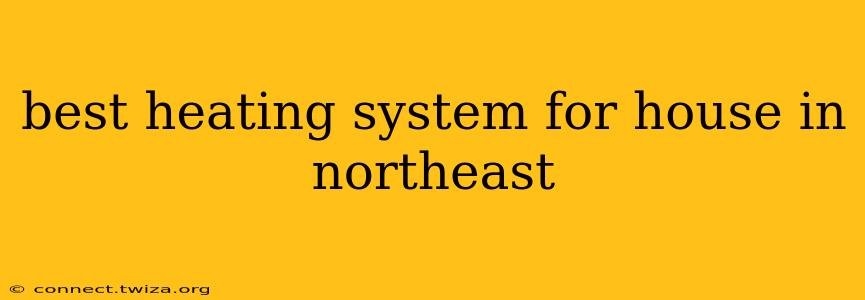The Northeast US experiences harsh winters, demanding a robust and efficient heating system. Choosing the right one can significantly impact your comfort, energy bills, and home's value. This guide explores the best heating options for Northeast homes, considering factors like climate, home size, budget, and energy efficiency.
What are the most efficient heating systems?
Efficiency is paramount in the Northeast's frigid climate. Heat pumps, particularly those with advanced features like cold-climate models, consistently top the charts for efficiency. They excel at both heating and cooling, offering significant energy savings compared to traditional furnaces. High-efficiency furnaces (those with an AFUE rating of 95% or higher) are another excellent option, particularly for larger homes or those not suitable for heat pumps.
What is the cheapest heating system to install?
While initial installation costs vary widely based on home size and specific needs, ductless mini-split heat pumps often present a more affordable entry point than installing a whole-house system like a high-efficiency furnace and ductwork. However, the long-term savings on energy bills often outweigh the higher upfront investment of more efficient systems.
What is the best type of heating system for a small house?
For smaller homes, ductless mini-split heat pumps are a fantastic choice. Their zoning capabilities allow for customized heating in different areas, preventing energy waste. They're also relatively easy to install, minimizing disruption. Electric baseboard heating is another option, though it's generally less efficient than heat pumps.
What is the best heating system for a large house?
Larger homes often benefit from high-efficiency furnaces paired with well-insulated ductwork. While the initial investment is higher, the capacity to heat a larger space efficiently makes it a worthwhile consideration. However, even in larger homes, a combination of high-efficiency furnaces and heat pumps could offer optimal efficiency and comfort. Consider zoning systems for larger homes to control temperatures in specific areas.
What are the different types of heating systems for homes?
Several heating systems cater to different needs and budgets:
-
Forced-air furnaces: These use a furnace to heat air, which is then distributed through ductwork throughout the house. They are common but can be less efficient than other options. High-efficiency models are improving efficiency significantly.
-
Heat pumps: These systems move heat rather than generate it, offering significant energy savings. Air-source heat pumps draw heat from the outside air, even in cold temperatures (cold-climate models are best for the Northeast). Geothermal heat pumps utilize the earth's stable temperature for even greater efficiency.
-
Electric baseboard heating: Electric baseboard heaters provide direct heat but can be expensive to operate, particularly in the Northeast.
-
Radiant floor heating: This system heats the floor, providing even and comfortable warmth. It can be expensive to install, especially in existing homes.
-
Boilers: Boilers heat water, which is then circulated through radiators or radiant floor systems. They are efficient but require more maintenance than some other options.
How much does it cost to install a new heating system?
The cost varies drastically depending on the system type, home size, and installation complexity. Factors such as whether ductwork needs to be installed or replaced heavily influence the final price. It's crucial to obtain multiple quotes from reputable HVAC contractors.
How do I choose the best heating system for my home in the Northeast?
Selecting the ideal heating system requires careful consideration:
-
Climate: The Northeast's harsh winters necessitate a system capable of handling extremely low temperatures.
-
Home size: Larger homes require more powerful systems.
-
Budget: Initial installation costs and long-term operating costs need to be weighed carefully.
-
Energy efficiency: Prioritize systems with high efficiency ratings to minimize energy bills.
-
Home construction: The existing ductwork (if applicable) and insulation levels impact the efficiency of different systems.
-
Maintenance: Consider the long-term maintenance requirements of different systems.
By carefully considering these factors and seeking professional consultation from a reputable HVAC contractor, you can make an informed decision and choose the best heating system for your Northeast home. Remember that a well-maintained system, regardless of type, is crucial for optimal performance and longevity.
